The Government Needs to Have Courage to Revisit its Economic Policy
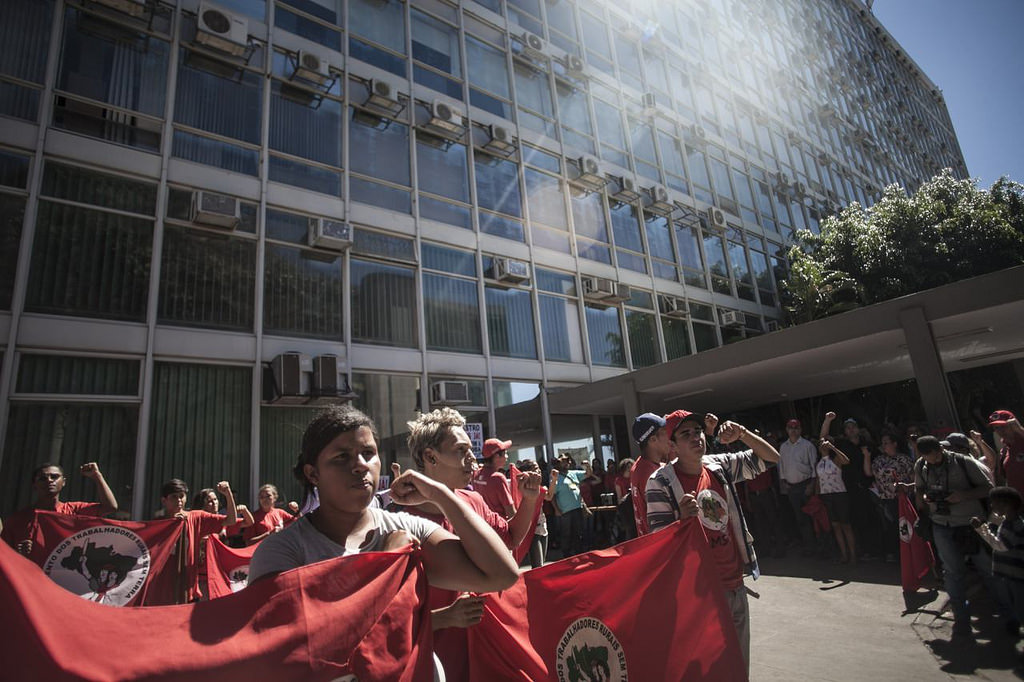 By Luiz Felipe Albuquerque
By Luiz Felipe Albuquerque
On Monday August 3, many offices of the Ministries of Finance were occupied by thousands of landless across the country. They included the offices of the Ministries of Finance of Brasilia, Porto Alegre, Recife, Fortaleza, Florianópolis, Curitiba, Palmas, Paraíba, Bahia, Rondônia and Sergipe.
The main goal is to denounce the fiscal adjustment of the federal government, which among other things, cut nearly 50% of the resources intended for agrarian reform for this year - from R $ 3.5 billion to only $ 1.8 billion.
To better understand what is happening, we interviewed Deborah Nunes, from the national MST leadership.
"We want everyone to know that it is the Ministry of Finance that implements the economic policy dictated by capital and the bourgeoisie against the Brazilian people," she says.
For her, "the government must have the courage to revise this policy and take measures to solve economic problems, but the ones who should actually pay the bill are the rich, the bourgeoisie and finance capital. To have the courage to tax large fortunes and make the wealthiest pay more taxes. "
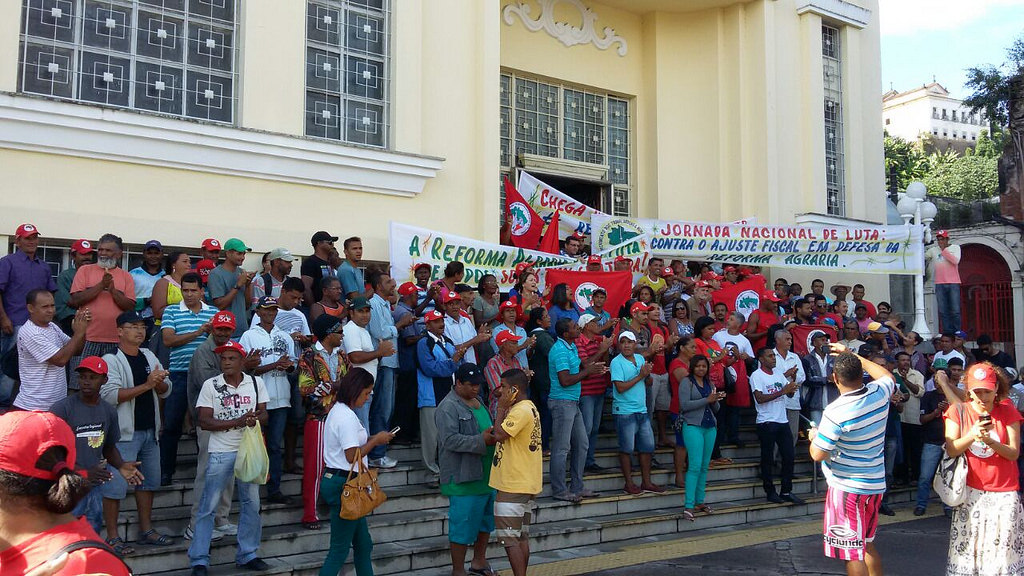 Occupation of the Finance Ministry in Salvador da BahiaCaption
Occupation of the Finance Ministry in Salvador da BahiaCaption
Why are the various ministries of Finance throughout the country being occupied by the landless workers?
The Ministry of Finance is responsible for the austerity measures that have consistently made impossible the public investments that would prioritize education, health, land reform, among many other policies that are needed to improve the living conditions of people.
It is this ministry that ensures the conditions for solving the problems in the deficit of public accounts, in the name of economic balance between revenues and expenditures. Conditions that allow financial capital to continue making lots of money through speculation, high interest rates and tax exemption for companies and taking away the rights of workers.
We want everyone to know that it is in the Ministry of Finance where the economic policy dictated by capital and the bourgeoisie is put in practice against the Brazilian people.
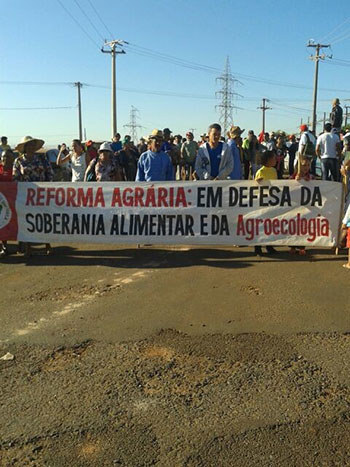 Four hundred march in the city of Jaciara, in Mato Grosso
Four hundred march in the city of Jaciara, in Mato Grosso
How do you assess the economic policy of the current government?
Throughout her years in office, we have criticized Dilma's economic policy. But in this second term, there is a hardening and greater conservatism when it comes to economic issues, and an unwillingness to solve society's problems.
The government's call for austerity, proposing measures endorsed by the Federal Congress, House and Senate to reduce costs, have directly affected the achievements and rights of workers.
The goal of our occupations is to denounce and say that we are against the austerity measures, that we are against the government solve the problem of public accounts by hurting the working class, the poor, as in the case of Provisional Measures 664 and 665, leading to poor access to unemployment insurance and welfare benefits, measures that directly affect those who work in the this country. We cannot accept paying a bill that is not ours.
And the occupations are the way we found to say to President Dilma and to Minister Joaquim Levy (of Finance) that they need to listen to the people.
The government must have the courage to revise this policy and take measures to solve economic problems, but the ones who should actually pay the bill are the rich, the bourgeoisie and finance capital. To have the courage to tax large fortunes and make the wealthiest pay more taxes.
We want the government to resume agrarian reform with measures aimed at the settlement of all the families in encampments and the conditions in the settlements so that we can live in the countryside with dignity and fulfill our task of producing healthy food to feed the people of Brazil. And this is not done with this economic policy that has been put in place.

Left: Finance Ministry occupied in Palmas (TO)
What are the consequences of the austerity measures?
It's a disaster for the working class, taking away rights and benefits that were already won. Cutting the budget of ministries that directly serve the poor, such as education, health, housing, agrarian reform. Increase in energy bills in the basic “basket”. All this accompanied by rising unemployment.
This creates a very bad atmosphere in society, because every day you realize that the situation is worsening because while the people feel the increasing difficulties, on the other hand we have the "powers" using politics to solve their own problems. An example is the judiciary in the Committee on Constitution, Justice and Citizenship (CCJ) approving the increased to 78% for the servers of the judiciary or the way that legislators are helpful to the companies that finance their campaigns.
The consequences are disastrous and society, organizations and social movements have the task of denouncing and struggling against this.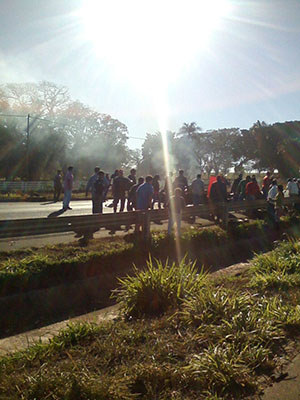
Highway closure in MG
And how does agrarian reform fit into this?
Agrarian Reform has not been a priority. Because besides the austerity measures lessening expenses by taking away benefits and rights of workers through the parliamentary measures, they also carried out many large budget cuts, in areas that directly affect the population, that is in basic health services, education, and social programs. Cuts in agrarian reform go against the expectations generated by the government itself.
The 120,000 families who are in encampments cannot be settled on land if the government does not prioritize the allocation of resources. The Ministry of Agrarian Development (MDA) and INCRA had proportionately the second largest budget cut, nearly 50% of their budget.
This makes it hard to settle the families who have been in encampments, some for over 10, 15, 18 years in the struggle. We need to take seriously the need to implement agrarian reform, ensuring social and productive infrastructure in the settlements, so that we have a countryside with people who do not want to go huddle in cities.
We want to build another model of agriculture, producing healthy foods, ensuring a dignified life in the countryside with men, women, children and youth. A countryside that allows young people to remain with access to culture, education and recreation. A model that generates seven jobs for every ten that is created in the countryside.
In that sense, the austerity measures, cuts and lack of prioritization by the government for the settlement policy directly affects Agrarian Reform
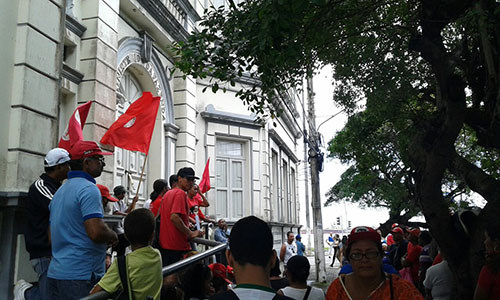
Landless workers continue the struggle in Sergipe.
How do you assess the political nod that the current government had been giving for Agrarian Reform?
The government's speech that agrarian reform is a priority, a concern related to ensuring the production of healthy food, will not be effective if that speech is not related to ensuring necessary conditions for it to become effective, such as the immediate restoration of the budget.
Agrarian Reform will not happen by magic It takes political will and courage to face the landowners, agribusiness and the conservative Congress. A Congress where the vast majority of senators and deputies represent and defend the interests of companies that financed their elections.
The government needs to call on society to discuss these issues and seek alternatives that lead to structural changes and not only palliative measures and put the problem off today for tomorrow.
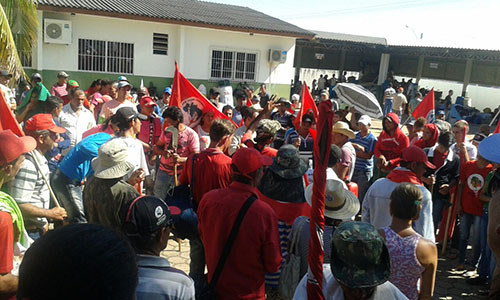 In Rondônia, around de 300 occupy the INCRA officeCaption
In Rondônia, around de 300 occupy the INCRA officeCaption
.
Beyond the political courage to confront the agribusiness model, agrarian reform needs to be accompanied by budget and financial guarantees for the agencies that deal with land reform, especially INCRA, with the guarantee of public funds for restructuring the agency so that in fact agrarian reform policy becomes effective and can succeed, solving the problem of who is in the countryside and also the structural problems experienced by all of society, such as the lack of urban mobility, increasing population in the cities, higher prices and the poisoning of food.
The consequences of the austerity measures have directly interfered with everyday issues of the population. People are paying monthly increases in electricity rates, the cost of basic food increases day by day, and these things are also directly related to what happens in the countryside. To carry out agrarian reform will also contribute to the solution of the problems that are in the cities but were born in the countryside.
But the campaign is not just for land, there are also questions about the settlements?
Yes, and they are problems arising from the absence of a serious policy for the countryside. The difficulties in some cases express the absence of the state in ensuring structural policy that enables the basic conditions of social reproduction and productive agrarian reform.
It is unacceptable that we have settlements that have existed for more than 15 years and they do not have clean drinking water.
Or families settled 10 years ago and still lacking a place to live. Settlements that have electricity, but are lacking the productive and economic needs, either in the use of machinery and equipment required for production, or to run agro-industrial equipment.
Problems of settlements that are stranded and isolated when it rains, because access roads are in terrible condition.
If we look at the credit that is essential for the production, we see that has been most often a problem rather than a solution to support the organization of production. Credit has been limited, bureaucratic and supportive of the conventional technological package, which poisons the food. The kind of credit that increases indebtedness and undermines families.
We also understand that Agrarian Reform has to be implemented to ensure basic and fundamental conditions for people who live in the settlements, like health and education, especially of youth.
Our youth understand that to stay in the countryside there needs to be education at all levels as well as work, the perfect combination to move forward in changing technological matrix to agroecology.
Finally the problems in the settlements are the result of what has not been done by the state and governments.
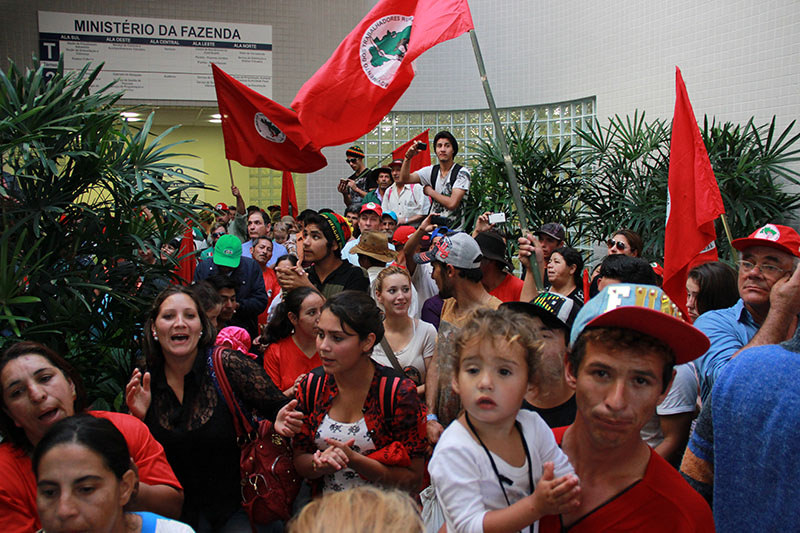
In Florianópolis (SC), around 500 rural workers occupy the Ministry of Finane.
For this, the MST proposes the Agrarian Reform Program to Accelerate Growth. What would that be?
The infrastructure investment program (CAP) for Agrarian Reform is a proposal submitted to the government for a program of actions to build the structural conditions the organization and development of settlements, such as water for consumption and production, access roads and traffic regulations, electrification, agricultural industries, structuring cooperatives, construction of community centers that can serve as socializing space within the settlements, construction of schools and children's day care centers and health clinics.
A set of actions that are important and cannot be held hostage to bureaucracy and political interference or people who do not have a commitment to agrarian reform. In short, it is a program to structure settlements, solving the existing liability. We want only that the state do what it has failed to do and to comply in the settlement areas.
This program is part of a new project for Brazilian agriculture proposed by the MST for society, what we call the People's Agrarian Reform, that of the need for democratization, preservation of assets of nature and all biodiversity, production of healthy food from agroecology, schools at all levels and profound changes in the way the countryside is viewed.
This proposal needs a policy decision by the government and for the entire working class to be ready to struggle to build people's agrarian reform and all other structural changes needed by society.
